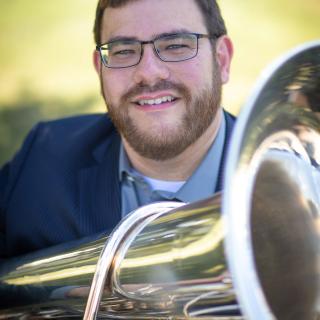Teaching Philosophy
The core of my mission as a teacher has always been predicated on these six words: identifying, building, and expanding student strengths. This philosophy of building strength into areas of former weakness is the underpinning motive behind my work in both the studio and classroom and encourages my students to develop the life-long practice of chasing success.
I train my students to strive for goal-oriented practice. Rather than approaching music in an effort to perform with immediate and total perfection, I encourage my students to pursue tangible and individual outcomes each time they approach their instrument. The approach of goal-oriented practice allows students to direct their practice time to the process of gradually addressing each of their areas of musical weakness, which serves to build a lasting facility and technique on their instrument.
Every musician is unique, and each of us have diverse areas of musical strengths (whether it is articulations, slurs, technique, intonation, audiation, and more) that come more naturally to us than other areas. After I have helped a student to identify their personal areas of musical strength and weakness, I work with them to develop a series of practice goals. The purpose of these goals is to bring the authority, control, and relaxation found in each student’s strengths to the areas of their weaknesses. Additionally, developing and expanding musical strengths into areas of former weakness serves to encourage the development of consistency in all areas of a student’s playing.
I have often found that young musicians will develop a habit of focusing solely on what has gone wrong in their practice or performance. While correcting errors is essential to improvement, my mission as a teacher is to continually build a student’s ability to recognize when they are executing a musical idea with success. Striving for success, rather than focusing on failures, serves to instill positivity into music-making, and causes my students to gain enjoyment, fulfillment, and consistent improvement from their practice sessions. The results of my studio teaching methods have been exceptional, as many graduates of my studio have gone on to win competitive graduate teaching assistantships and scholarships at institutions throughout the United States (including the University of Illinois Urbana-Champagne, Michigan State University, and the Boston Conservatory).
Because music is an intrinsically personal art, I encourage the growth of confidence, expression, and creativity and the reduction of negativity and tension as a key element in my teaching. I strive to make both my studio lesson and classroom teaching an uplifting and inspiring experience for my students through positive feedback, constructive criticism, and musical modeling. I firmly believe that the process of developing as a musician and performer is a self-perpetuating cycle. This cycle starts with practice, which leads to improvement. Improvement allows students to perform more challenging music and work with better musicians, which leads to fulfillment and enjoyment in music-making. That enjoyment serves to instill a desire to continue to practice, which perpetuates this cycle and propels my students into success.

